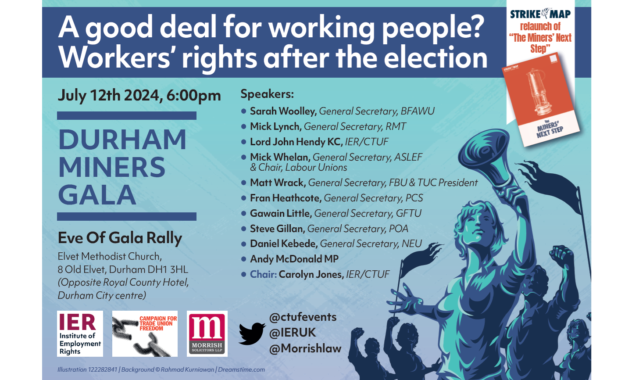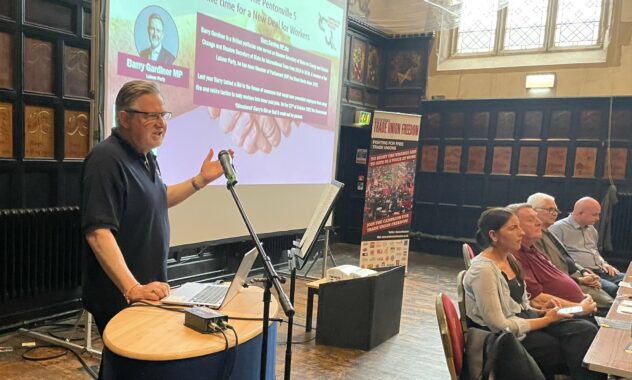Pre-Gala Fringe Event hears trade union leaders call for a Second Employment Rights Bill
The IER, in collaboration with the CTUF, People's Assembly and Morrish Solicitors, hosted a discussion on the ERB at this year's Miners' Gala

The Institute of Employment Rights (IER), in collaboration with the Campaign for Trade Union Freedom, the People’s Assembly and supported by Morrish Solicitors, hosted a pre-gala rally at this year’s Durham Miners’ Gala. The event brought together trade unionists and labour movement leaders to discuss the path toward a second Employment Rights Bill—one that aims to go significantly further in strengthening collective labour rights and reversing decades of worker disempowerment in the UK.
We were honoured to be meeting in the stunning Pittman’s Parliament, a monument of industrial heritage paid for by miners in County Durham. Speakers were Mary Kelly Foy MP, Lord John Hendy KC, Fran Heathcote (General Secretary PCS), Mike Masters (Birmingham Bin Strikers), Sarah Woolley (General Secretary BFAWU), and Daniel Kebede (General Secretary NEU). This discussion was chaired by Carolyn Jones (IER and CTUF).
The rally opened with a speech from the Labour MP for the City of Durham, Mary Kelly Foy, who praised the Employment Rights Bill as a ‘huge step’ towards the generational change we need after 14 years of assaults on trade unions and workers. Foy described the Bill as a good first step but not ‘job done’ . Speakers acknowledged that while the Bill does indeed bring about changes that have long been campaigned and fought for by the trade union movement, the Bill risks overreliance on individual employment rights that, without effective enforcement, are less likely to materialise on the shop floor. Speakers were resolute that the first step towards this will be releasing trade unions from the shackles of anti-union legislation that expands over the past four decades- as well as introducing collective provisions, especially sectoral collective bargaining and the right to take sympathy action.
Mary Kelly Foy MP:
If we are to genuinely grow our economy, a huge part of that involves improving living standards, and rebalancing rights at work is essential to achieving that”
Lord John Hendy focused on the issue of restoring power to workers:
power in the workplace comes from collective bargaining backed by the right to strike, and this Bill does not provide the rights that unions need.”
Unions are continuing the call to repeal anti-trade union legislation, despite the Governments’ welcome actions in repealing the Minimum Service Levels Act and most of the TU Act 2016, because there are still a series of Acts of Parliament brought forward between 1982 and 1992 which imposed immense restrictions on Trade Unions ability to impose industrial action. Lord Hendy is currently engaging with the Bill as it passes through Report Stage, where he will be tabling two amendments that seek to introduce sectoral bargaining and the right to secondary action.
Sarah Woolley, General Secretary of the Bakers’ Union, echoed John Hendy’s concerns that the Bill will not deliver for working class people – highlighting that failing to bring sectoral bargaining forward will leave issues of low pay and insecure contracts persisting. The important issue of workplace access, which would allow Unions the right to enter workplaces for crucial organising and recruiting, has, in Woolley’s view, been reduced to an access request:
We should not be knocking at the door politely asking for scraps. We should absolutely be demanding our rights as the organising working class. Without workplace access there is no real organising, and without organising there is no workplace power”
We were especially pleased to hear from Mike Masters, a Unite Rep and striking refuse worker part of the Birmingham Bin Strike. Summarising the on-going dispute with Birmingham City Council, who’s proposals to remove WRCO roles will deliver wage cuts of up to £8,000 a year.
Mike Masters:
Our employers not only took our pay, but they have attacked our right to strike, our right to demonstrate, our dignity. They have issued section 14s, hired security guards, installed CCTV, police on the picket lines, more recently- an injunction. False allegations against reps resulting in wrongful arrests, and recently a rep being dismissed – all that has cost £300 million.”
General Secretaries Fran Heathcote and Daniel Kebede each discussed the importance of unity in the trade union movement, especially in light of Reforms’ posturing as the party of working people. Speakers expressed concern that with the Government’s prevarication on delivering meaningful collective labour rights for workers- which will defeat issues of low pay, insecure contracts and employer exploitation- the door will be left open for disingenuous and divisive politics.
We would like to thank all those who attended our rally, and hope to see you again next year.







